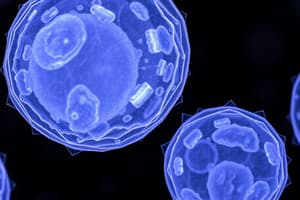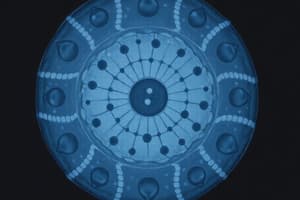Podcast
Questions and Answers
What is the main purpose of cell cycle checkpoints?
What is the main purpose of cell cycle checkpoints?
- To speed up the cell division process
- To prevent cells from progressing if they are defective (correct)
- To produce energy for the cell
- To promote programmed cell death
Which phase of the cell cycle does the G1 checkpoint occur?
Which phase of the cell cycle does the G1 checkpoint occur?
- G1 Phase (correct)
- S Phase
- Mitosis
- G2 Phase
What are the three stages of interphase?
What are the three stages of interphase?
- Prophase, Metaphase, Anaphase
- Synthesis Phase, Division Phase, Growth Phase
- G1 Phase, S Phase, G2 Phase (correct)
- Cytokinesis, Telophase, Interkinesis
If a cell fails the G2 checkpoint, what can happen?
If a cell fails the G2 checkpoint, what can happen?
What follows interphase in the cell cycle?
What follows interphase in the cell cycle?
Which phase of the cell cycle involves the physical division of the cytoplasm?
Which phase of the cell cycle involves the physical division of the cytoplasm?
What is the main role of cyclins in the cell cycle?
What is the main role of cyclins in the cell cycle?
During which stage of mitosis do the sister chromatids move to opposite poles of the cell?
During which stage of mitosis do the sister chromatids move to opposite poles of the cell?
What is the function of CDK inhibitors (CKIs) in cell cycle regulation?
What is the function of CDK inhibitors (CKIs) in cell cycle regulation?
Which phase of the cell cycle involves synthesizing necessary proteins and performing additional checks after DNA replication?
Which phase of the cell cycle involves synthesizing necessary proteins and performing additional checks after DNA replication?
Flashcards are hidden until you start studying
Study Notes
Understanding the Cell Cycle: Checkpoints, Phases, and Control Mechanisms
At the heart of life's growth and reproduction lies a well-orchestrated sequence of events known as the cell cycle. This process ensures that cells replicate their genetic material, divide, and maintain proper function. In this article, we'll explore the crucial aspects of the cell cycle, including cell cycle checkpoints, interphase, mitosis, cytokinesis, and the regulation of this essential process.
Cell Cycle Checkpoints
Cell cycle checkpoints act as quality control measures, preventing cells from progressing to the next stage if they're defective. There are two primary checkpoints: the G1 checkpoint, which occurs at the end of G1 phase, and the G2 checkpoint, which takes place at the end of G2 phase. These checkpoints verify that the cell's DNA has been replicated accurately and that the cell has sufficient energy and resources to proceed. If a cell fails these checks, it may either halt the cell cycle or undergo programmed cell death to prevent the propagation of errors.
Interphase
Interphase is the non-dividing portion of the cell cycle, during which the cell grows, synthesizes proteins, and prepares for division. Interphase consists of three stages: G1 phase, S phase, and G2 phase.
- G1 phase: During G1, the cell grows and synthesizes proteins and organelles necessary for cell division.
- S phase: In S phase, the cell replicates its DNA, ensuring that each daughter cell contains an identical copy of the parent cell's genetic material.
- G2 phase: In G2 phase, the cell grows further, synthesizes necessary proteins, and performs additional checks to confirm DNA replication has been accurate and complete.
Mitosis
Mitosis is the process of cell division that results in the formation of two genetically identical daughter cells. Mitosis is divided into five stages: prophase, prometaphase, metaphase, anaphase, and telophase.
- Prophase: During prophase, the nuclear envelope breaks down, the chromosomes condense, and the spindle fibers begin to form.
- Prometaphase: In prometaphase, the nuclear envelope is completely disassembled, and the chromosomes become visible in the cell.
- Metaphase: At metaphase, the spindle fibers attach to the chromosomes, and they align themselves at the metaphase plate, which is the middle of the cell.
- Anaphase: During anaphase, the sister chromatids are pulled apart by the spindle fibers and move to opposite poles of the cell.
- Telophase: At telophase, the chromosomes begin to decondense, and the nuclear envelope re-forms around the chromosomes.
Cytokinesis
Cytokinesis is the physical division of the cytoplasm, which results in the formation of two daughter cells from a single cell. During cytokinesis, the cytoplasm is partitioned, the cell membrane pinches inward, and a new cell membrane forms between the two daughter cells.
Regulation of the Cell Cycle
The cell cycle is regulated by a complex set of proteins that interact to control the progression of the cycle. The primary regulatory proteins include cyclins, cyclin-dependent kinases (CDKs), and CDK inhibitors (CKIs). Cyclins are proteins that bind to CDKs to activate them. CDKs, in turn, phosphorylate and regulate the activity of various proteins involved in cell cycle progression. CKIs, on the other hand, delay cell cycle progression by inhibiting cyclin-CDK complexes.
In summary, the cell cycle is an essential process that ensures the proper propagation of genetic material and cell growth. Through checkpoints, interphase, mitosis, and cytokinesis, cells are able to maintain a high degree of accuracy and integrity. The cell cycle is also regulated by complex interactions between cyclins, CDKs, and CKIs to ensure that cells progress through the cycle in a controlled and orderly manner.
Studying That Suits You
Use AI to generate personalized quizzes and flashcards to suit your learning preferences.




